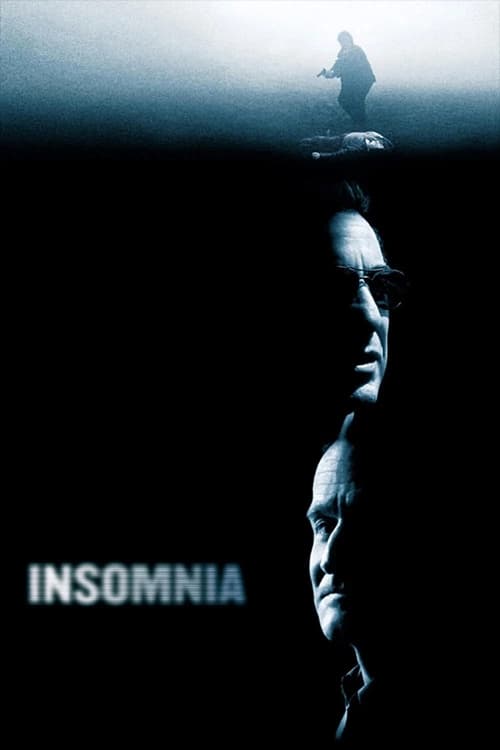A Haunting Exploration of Guilt, Isolation, and Moral Ambiguity in the Land of the Midnight Sun
/10
Posted on June 7, 2025
Insomnia, directed by Christopher Nolan, is a psychological thriller that delves deep into the murky waters of guilt, isolation, and moral ambiguity in the remote and eerie landscape of Alaska. With standout performances by Al Pacino and Robin Williams, the film offers a chilling and psychologically complex narrative that keeps viewers on the edge of their seats while raising thought-provoking questions about the nature of truth, justice, and the human psyche.
Nolan’s direction is a masterstroke of atmospheric tension, as he skillfully navigates the film’s morally ambiguous terrain with a keen eye for visual storytelling and psychological depth. From the desolate expanses of the Alaskan wilderness to the claustrophobic interiors of the local police station, Nolan creates a sense of unease and disorientation that mirrors the inner turmoil of the film’s protagonist. The film’s use of light and shadow, coupled with its stark cinematography and haunting sound design, immerses viewers in a world of psychological suspense and moral complexity that lingers long after the credits roll.
The screenplay, written by Hillary Seitz and based on the original 1997 Norwegian film of the same name, is a work of narrative precision and emotional nuance that explores themes of guilt, deception, and the unraveling of truth in the face of personal and professional compromise. The central narrative, which follows an insomniac detective investigating a murder in the land of the midnight sun, unfolds with a slow-burning intensity and narrative ambiguity that challenges viewers to question their own perceptions of reality and morality. The film’s thematic exploration of guilt and redemption, as embodied by Pacino’s haunted detective and Williams’ enigmatic suspect, adds layers of emotional depth and moral complexity to the film’s gripping narrative.
Pacino’s performance as Detective Will Dormer is a tour de force of psychological intensity and moral ambiguity, as he navigates the treacherous waters of guilt, deception, and self-preservation with a haunted intensity and raw vulnerability. Williams’ portrayal of the enigmatic crime novelist Walter Finch is equally compelling, capturing the character’s manipulative charm and hidden darkness with a chilling precision and emotional depth that adds layers of complexity to the film’s central mystery. The chemistry between Pacino and Williams is electric, infusing their scenes together with a palpable sense of tension, intrigue, and moral conflict that drives the film’s narrative forward with a relentless momentum.
The film’s cinematography, overseen by Wally Pfister, is a visual feast of stark contrasts, expressive compositions, and evocative framing that enhances the film’s mood and thematic resonance. Pfister’s use of natural light, dynamic camera movements, and unconventional angles creates a sense of unease and psychological tension that mirrors the film’s exploration of guilt, deception, and the unraveling of truth in the face of personal and professional compromise. The film’s iconic shots of the Alaskan wilderness, the fog-shrouded streets of Nightmute, and the dimly lit interiors of the police station serve as a backdrop for the characters’ emotional journeys and moral dilemmas, highlighting the film’s exploration of isolation, moral ambiguity, and the haunting power of the human conscience.
While Insomnia is hailed as a psychological thriller that pushes the boundaries of the genre, it is not without its flaws. Some critics have pointed out the film’s pacing and narrative structure as potential sources of narrative confusion and thematic inconsistency, particularly in the film’s resolution and moral resolution. The film’s treatment of its female characters, including the role of the local detective played by Hilary Swank, may be seen as underdeveloped or sidelined in favor of the male-driven narrative, raising questions about the representation and agency of women in a male-dominated genre. Additionally, the film’s ambiguous ending and unresolved character arcs may leave some viewers feeling unsatisfied or uncertain about the ultimate fates of the characters and the moral implications of their actions.
In conclusion, Insomnia stands as a haunting and psychologically complex thriller that challenges viewers to confront their own inner demons, moral compromises, and ethical boundaries in a world of shadows and secrets. Christopher Nolan’s atmospheric direction, Al Pacino and Robin Williams’ powerhouse performances, and the film’s evocative visuals and haunting score combine to create a cinematic experience that is as intellectually stimulating as it is emotionally resonant. A gripping tale of guilt, isolation, and moral ambiguity, Insomnia remains a thought-provoking work of art that continues to provoke, disturb, and engage audiences with its timeless exploration of the human psyche and the haunting power of the past.
0
0
